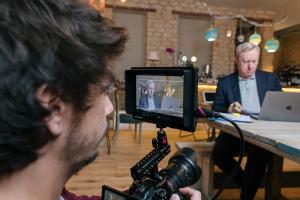
ODE CEO Gordian Overschmidt discusses how fostering decision-making skills in education builds resilience, critical thinking, and empowers future leaders.
— Gordian Overschmidt
BERLIN, GERMANY, September 11, 2024 /EINPresswire.com/ — In an era of rapid change, teaching decision-making skills has become essential for educators and leaders. Gordian Overschmidt, CEO and Co-Founder of ODE (Objectified Decision Engine), shares insights on fostering resilience, adaptability, and informed decision-making.
Interviewer: Gordian, thank you for joining us. What inspired the creation of ODE as a social and solidarity economy entity?
Gordian Overschmidt: The inspiration for ODE came from observing how many individuals—especially young people—struggle with decision-making. Whether choosing a school or career path or navigating personal choices, many feel stuck, relying on trends or opinions rather than making informed decisions.
A student once told me during the French elections, “I won’t vote; they don’t listen to my decisions anyway.” That feeling of disengagement clearly showed that people needed better tools to understand how decisions affect their lives. At ODE, we aim to empower individuals with the knowledge and strategies to make more informed decisions. This is vital because decisions shape our lives, but we can change direction only through new choices.
Interviewer: You’ve mentioned that “decisions shape our path, but only new decisions can change our direction.” Can you expand on this concept?
Gordian: Absolutely. Many people feel weighed down by past decisions, thinking they can’t undo them. While we can’t change the past, we always have the power to make new choices that improve our future. This mindset shifts the focus from regret to proactive action, encouraging individuals to take control of their situations.
This philosophy fosters continuous growth. Whether personally or professionally, it’s crucial to embrace adaptability and make deliberate decisions that result in better outcomes.
Interviewer: How does this philosophy benefit individuals in personal and professional settings?
Gordian: In personal life, it helps individuals understand that past mistakes do not define them. There’s always the opportunity to make a new choice. Professionally, especially in fast-paced industries, adaptability is essential. Making conscious, well-informed decisions is critical to navigating career development and overcoming challenges.
Interviewer: Can you explain how this mindset made a significant difference?
Gordian: Certainly. I’ve worked with several companies facing challenges with product launches. Successful teams didn’t dwell on what went wrong but used those experiences to analyze and make new strategic decisions. Reflection is critical in the decision-making process, leading to successful product launches.
It exemplifies how turning setbacks into learning opportunities through deliberate decision-making can lead to more robust, more successful outcomes.
Interviewer: Resilience is a vital part of this approach. How can individuals develop resilience to make better decisions?
Gordian: Resilience comes from accepting failure as a natural part of learning. Building resilience involves adopting a growth mindset, seeking constructive feedback, and viewing challenges as opportunities for growth.
At its core, resilience is the ability to emerge more vital after facing challenges. ODE’s “Out-of-Brain” concept helps individuals find balance by harmonizing inner peace with uncertainty, accepting that uncertainty is part of the path toward strength and growth.
Interviewer: What advice would you offer someone hesitant to make decisions after facing setbacks?
Gordian: Start small. Making incremental decisions builds confidence and momentum. Reflect on past experiences, but don’t let them paralyze you. No matter how small, every decision is an opportunity to move forward and improve your direction.
Interviewer: Reflection seems to play a significant role in decision-making. How does this apply to education?
Gordian: Reflection is vital in education, especially when teaching decision-making as a life skill. We often teach students facts and figures, but we don’t focus enough on how to make informed decisions. Schools must integrate decision-making strategies into their curricula to help students become more confident and thoughtful in their choices—academically or in their future careers.
Interviewer: How does ODE address more significant societal issues, such as the rise of populism in Europe?
Gordian: The rise of populism, particularly with parties like the AfD in Germany, is rooted in a broader societal issue of disenfranchisement. People feel disconnected from the systems that govern their lives, leading them to make reactionary decisions based on fear or frustration.
ODE’s mission is to help individuals think critically about their decisions, not just for their lives but also for society. When people understand the broader consequences of their choices, they are less likely to make impulsive, reactionary decisions and more likely to contribute positively to their communities.
Interviewer: Do you think young people are particularly vulnerable to this disillusionment?
Gordian: Yes. When young people feel their voices aren’t heard, they tend to disengage, leading to frustration and, in some cases, support for extreme movements. By helping young people understand decision-making and empowering them to make informed choices, we can address this disillusionment and foster more thoughtful, proactive engagement.
Interviewer: What’s next for ODE?
Gordian: We are developing a workbook that delves deeper into decision-making strategies and their practical applications. We’re also launching workshops designed to teach individuals and organizations how to build practical decision-making skills. Additionally, we’re offering physical experiences that help people feel the elements of decision-making beyond the app.
Interviewer: Any final thoughts on how decision-making connects to education and democracy?
Gordian: Democracy thrives when people are empowered to make informed decisions. Every decision, large or small, contributes to the larger fabric of society. Strengthening decision-making skills is critical to preserving democratic values. ODE’s mission is to ensure that individuals, particularly young people, understand the impact of their choices and feel empowered to shape their futures.
Gordian Overschmidt
ODE.systems GmbH
email us here
Visit us on social media:
Facebook
LinkedIn
Instagram
YouTube
Other
Life of Criteria
Legal Disclaimer:
EIN Presswire provides this news content “as is” without warranty of any kind. We do not accept any responsibility or liability
for the accuracy, content, images, videos, licenses, completeness, legality, or reliability of the information contained in this
article. If you have any complaints or copyright issues related to this article, kindly contact the author above.
![]()
Originally published at https://www.einpresswire.com/article/741562694/empowering-choices-gordian-overschmidt-on-the-role-of-decision-making-in-education-resilience-and-democracy




